Contemporary Tourism: Economic, Socio-Cultural, Environmental Impacts
VerifiedAdded on 2023/06/09
|7
|2257
|54
Report
AI Summary
This report critically analyzes the necessity and importance of tourism, highlighting its role in supporting national economies, creating job opportunities, and fostering international relationships. It explores the rapid development of contemporary tourism and its impact on socio-cultural dynamics, the economy, and the environment. The report discusses the positive multiplier effect of tourism on the economy, including increased tax revenue, job creation, and improved living standards, while also acknowledging negative impacts such as the decline of traditional labor activities and environmental concerns. It emphasizes the importance of sustainable practices in tourism to minimize ecological impact and preserve natural resources. Furthermore, the report examines the socio-cultural effects of tourism, both positive and negative, on local customs, heritage, and infrastructure, stressing the need for balanced development to avoid overcrowding and cultural disruption. The report concludes that tourism drives constant change, leading to the improvement and development of the tourist industry within the economic environment and highlighting that the future expects a rise in such activities.
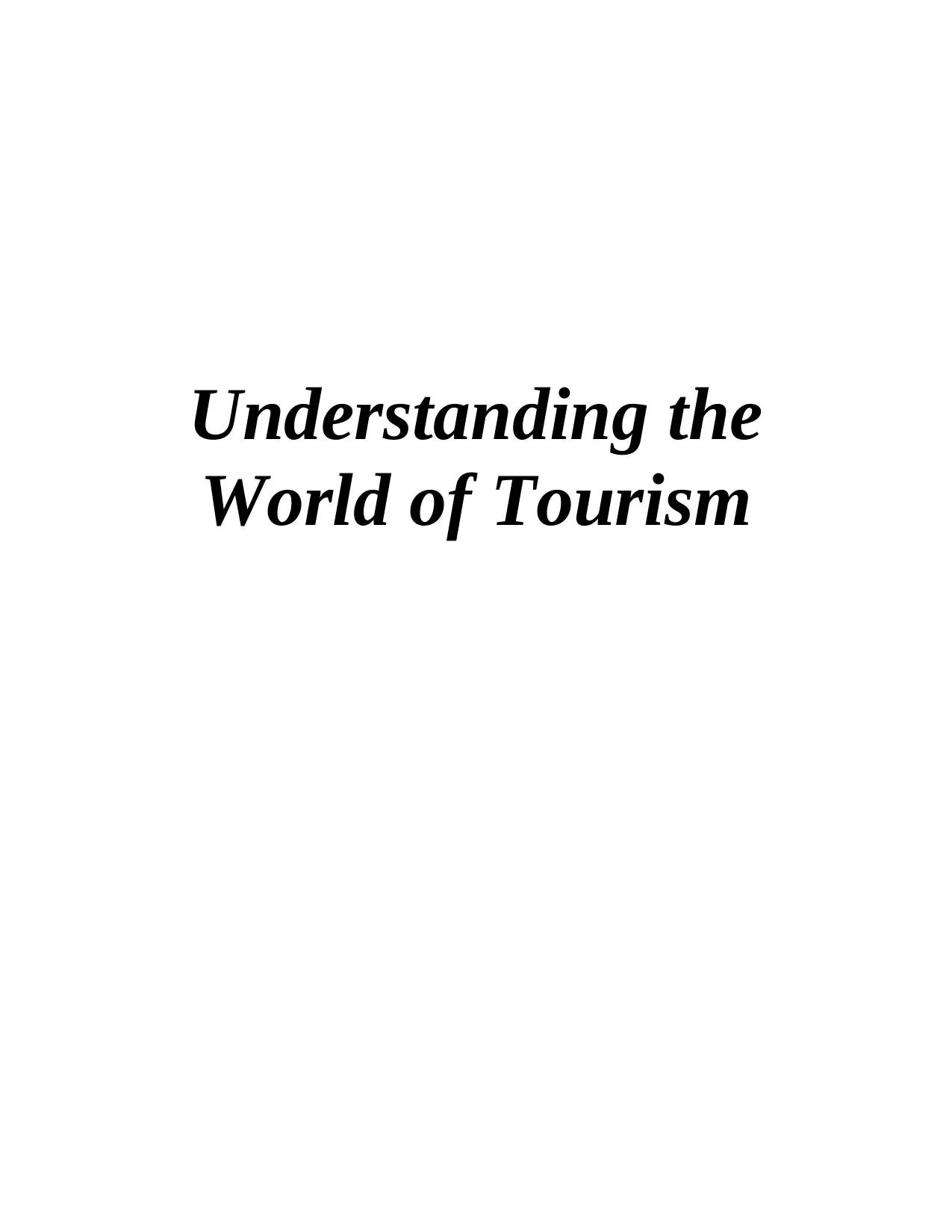
Understanding the
World of Tourism
World of Tourism
Paraphrase This Document
Need a fresh take? Get an instant paraphrase of this document with our AI Paraphraser
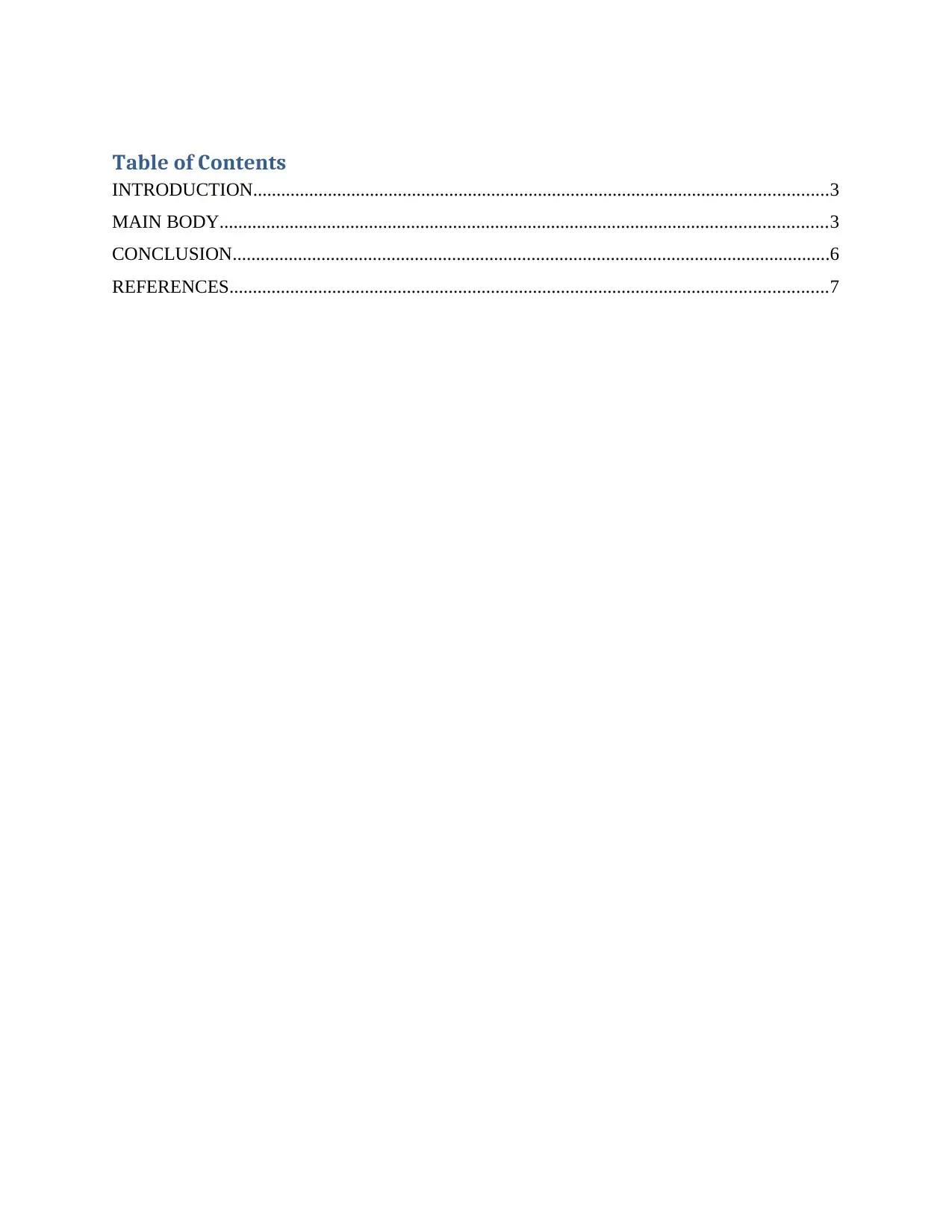
Table of Contents
INTRODUCTION...........................................................................................................................3
MAIN BODY..................................................................................................................................3
CONCLUSION................................................................................................................................6
REFERENCES................................................................................................................................7
INTRODUCTION...........................................................................................................................3
MAIN BODY..................................................................................................................................3
CONCLUSION................................................................................................................................6
REFERENCES................................................................................................................................7
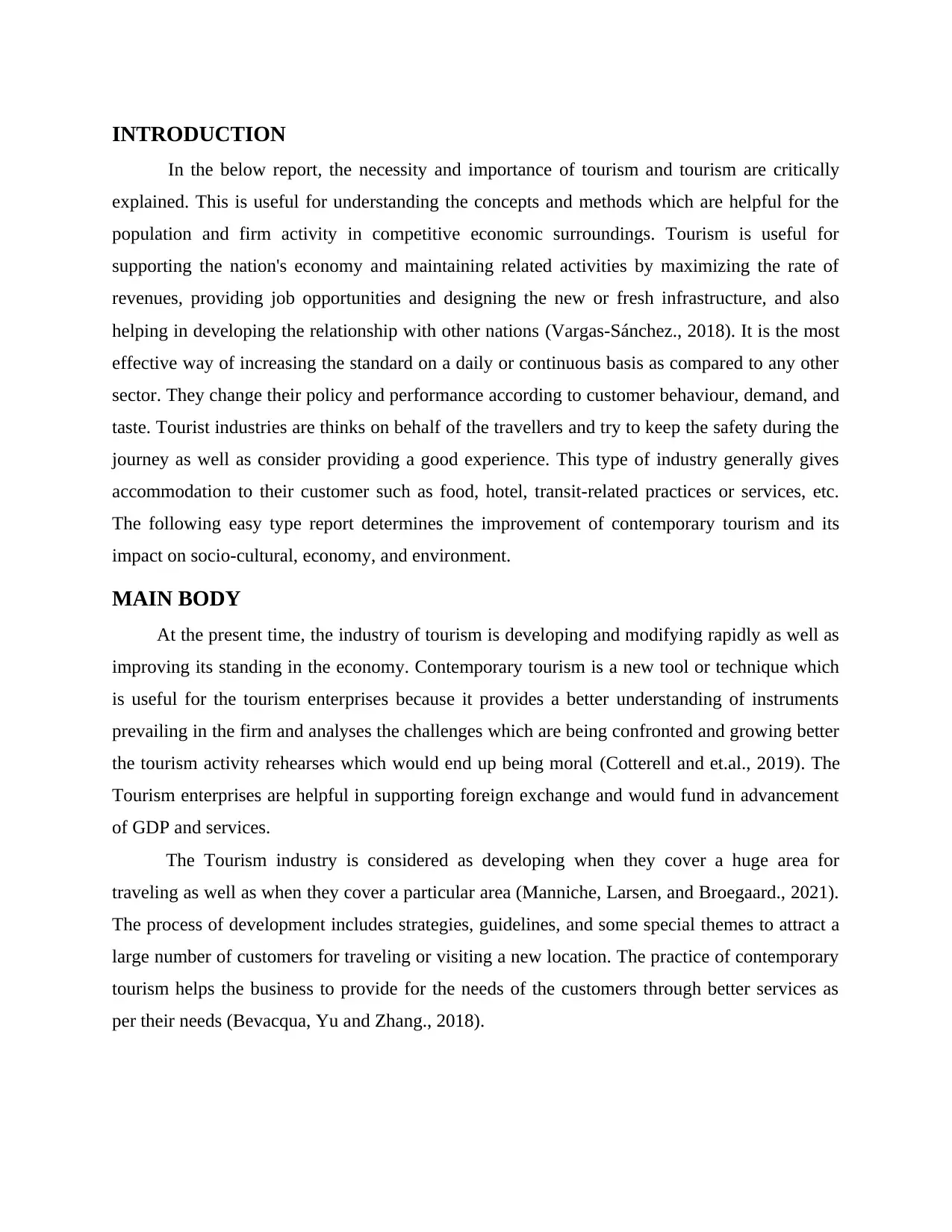
INTRODUCTION
In the below report, the necessity and importance of tourism and tourism are critically
explained. This is useful for understanding the concepts and methods which are helpful for the
population and firm activity in competitive economic surroundings. Tourism is useful for
supporting the nation's economy and maintaining related activities by maximizing the rate of
revenues, providing job opportunities and designing the new or fresh infrastructure, and also
helping in developing the relationship with other nations (Vargas-Sánchez., 2018). It is the most
effective way of increasing the standard on a daily or continuous basis as compared to any other
sector. They change their policy and performance according to customer behaviour, demand, and
taste. Tourist industries are thinks on behalf of the travellers and try to keep the safety during the
journey as well as consider providing a good experience. This type of industry generally gives
accommodation to their customer such as food, hotel, transit-related practices or services, etc.
The following easy type report determines the improvement of contemporary tourism and its
impact on socio-cultural, economy, and environment.
MAIN BODY
At the present time, the industry of tourism is developing and modifying rapidly as well as
improving its standing in the economy. Contemporary tourism is a new tool or technique which
is useful for the tourism enterprises because it provides a better understanding of instruments
prevailing in the firm and analyses the challenges which are being confronted and growing better
the tourism activity rehearses which would end up being moral (Cotterell and et.al., 2019). The
Tourism enterprises are helpful in supporting foreign exchange and would fund in advancement
of GDP and services.
The Tourism industry is considered as developing when they cover a huge area for
traveling as well as when they cover a particular area (Manniche, Larsen, and Broegaard., 2021).
The process of development includes strategies, guidelines, and some special themes to attract a
large number of customers for traveling or visiting a new location. The practice of contemporary
tourism helps the business to provide for the needs of the customers through better services as
per their needs (Bevacqua, Yu and Zhang., 2018).
In the below report, the necessity and importance of tourism and tourism are critically
explained. This is useful for understanding the concepts and methods which are helpful for the
population and firm activity in competitive economic surroundings. Tourism is useful for
supporting the nation's economy and maintaining related activities by maximizing the rate of
revenues, providing job opportunities and designing the new or fresh infrastructure, and also
helping in developing the relationship with other nations (Vargas-Sánchez., 2018). It is the most
effective way of increasing the standard on a daily or continuous basis as compared to any other
sector. They change their policy and performance according to customer behaviour, demand, and
taste. Tourist industries are thinks on behalf of the travellers and try to keep the safety during the
journey as well as consider providing a good experience. This type of industry generally gives
accommodation to their customer such as food, hotel, transit-related practices or services, etc.
The following easy type report determines the improvement of contemporary tourism and its
impact on socio-cultural, economy, and environment.
MAIN BODY
At the present time, the industry of tourism is developing and modifying rapidly as well as
improving its standing in the economy. Contemporary tourism is a new tool or technique which
is useful for the tourism enterprises because it provides a better understanding of instruments
prevailing in the firm and analyses the challenges which are being confronted and growing better
the tourism activity rehearses which would end up being moral (Cotterell and et.al., 2019). The
Tourism enterprises are helpful in supporting foreign exchange and would fund in advancement
of GDP and services.
The Tourism industry is considered as developing when they cover a huge area for
traveling as well as when they cover a particular area (Manniche, Larsen, and Broegaard., 2021).
The process of development includes strategies, guidelines, and some special themes to attract a
large number of customers for traveling or visiting a new location. The practice of contemporary
tourism helps the business to provide for the needs of the customers through better services as
per their needs (Bevacqua, Yu and Zhang., 2018).
⊘ This is a preview!⊘
Do you want full access?
Subscribe today to unlock all pages.

Trusted by 1+ million students worldwide
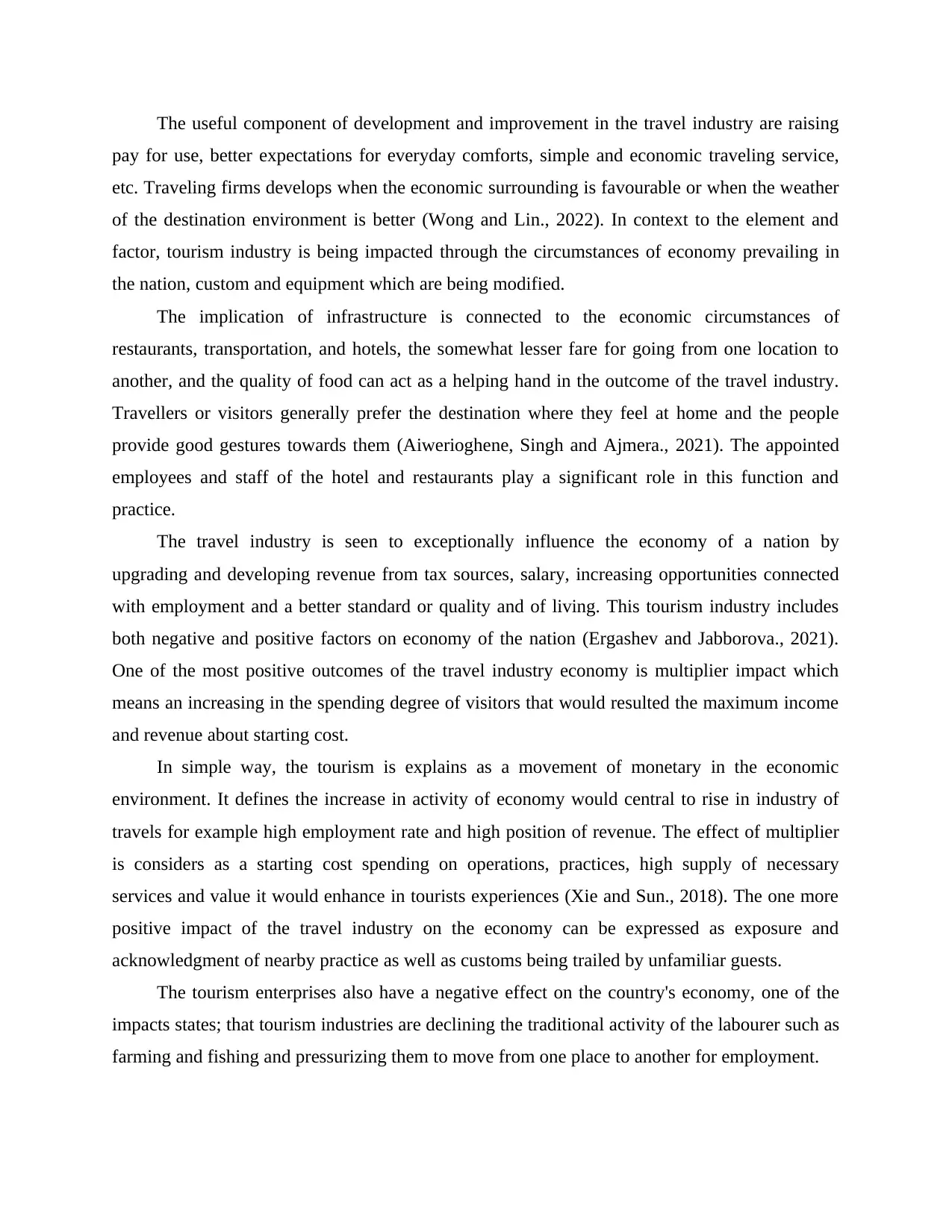
The useful component of development and improvement in the travel industry are raising
pay for use, better expectations for everyday comforts, simple and economic traveling service,
etc. Traveling firms develops when the economic surrounding is favourable or when the weather
of the destination environment is better (Wong and Lin., 2022). In context to the element and
factor, tourism industry is being impacted through the circumstances of economy prevailing in
the nation, custom and equipment which are being modified.
The implication of infrastructure is connected to the economic circumstances of
restaurants, transportation, and hotels, the somewhat lesser fare for going from one location to
another, and the quality of food can act as a helping hand in the outcome of the travel industry.
Travellers or visitors generally prefer the destination where they feel at home and the people
provide good gestures towards them (Aiwerioghene, Singh and Ajmera., 2021). The appointed
employees and staff of the hotel and restaurants play a significant role in this function and
practice.
The travel industry is seen to exceptionally influence the economy of a nation by
upgrading and developing revenue from tax sources, salary, increasing opportunities connected
with employment and a better standard or quality and of living. This tourism industry includes
both negative and positive factors on economy of the nation (Ergashev and Jabborova., 2021).
One of the most positive outcomes of the travel industry economy is multiplier impact which
means an increasing in the spending degree of visitors that would resulted the maximum income
and revenue about starting cost.
In simple way, the tourism is explains as a movement of monetary in the economic
environment. It defines the increase in activity of economy would central to rise in industry of
travels for example high employment rate and high position of revenue. The effect of multiplier
is considers as a starting cost spending on operations, practices, high supply of necessary
services and value it would enhance in tourists experiences (Xie and Sun., 2018). The one more
positive impact of the travel industry on the economy can be expressed as exposure and
acknowledgment of nearby practice as well as customs being trailed by unfamiliar guests.
The tourism enterprises also have a negative effect on the country's economy, one of the
impacts states; that tourism industries are declining the traditional activity of the labourer such as
farming and fishing and pressurizing them to move from one place to another for employment.
pay for use, better expectations for everyday comforts, simple and economic traveling service,
etc. Traveling firms develops when the economic surrounding is favourable or when the weather
of the destination environment is better (Wong and Lin., 2022). In context to the element and
factor, tourism industry is being impacted through the circumstances of economy prevailing in
the nation, custom and equipment which are being modified.
The implication of infrastructure is connected to the economic circumstances of
restaurants, transportation, and hotels, the somewhat lesser fare for going from one location to
another, and the quality of food can act as a helping hand in the outcome of the travel industry.
Travellers or visitors generally prefer the destination where they feel at home and the people
provide good gestures towards them (Aiwerioghene, Singh and Ajmera., 2021). The appointed
employees and staff of the hotel and restaurants play a significant role in this function and
practice.
The travel industry is seen to exceptionally influence the economy of a nation by
upgrading and developing revenue from tax sources, salary, increasing opportunities connected
with employment and a better standard or quality and of living. This tourism industry includes
both negative and positive factors on economy of the nation (Ergashev and Jabborova., 2021).
One of the most positive outcomes of the travel industry economy is multiplier impact which
means an increasing in the spending degree of visitors that would resulted the maximum income
and revenue about starting cost.
In simple way, the tourism is explains as a movement of monetary in the economic
environment. It defines the increase in activity of economy would central to rise in industry of
travels for example high employment rate and high position of revenue. The effect of multiplier
is considers as a starting cost spending on operations, practices, high supply of necessary
services and value it would enhance in tourists experiences (Xie and Sun., 2018). The one more
positive impact of the travel industry on the economy can be expressed as exposure and
acknowledgment of nearby practice as well as customs being trailed by unfamiliar guests.
The tourism enterprises also have a negative effect on the country's economy, one of the
impacts states; that tourism industries are declining the traditional activity of the labourer such as
farming and fishing and pressurizing them to move from one place to another for employment.
Paraphrase This Document
Need a fresh take? Get an instant paraphrase of this document with our AI Paraphraser
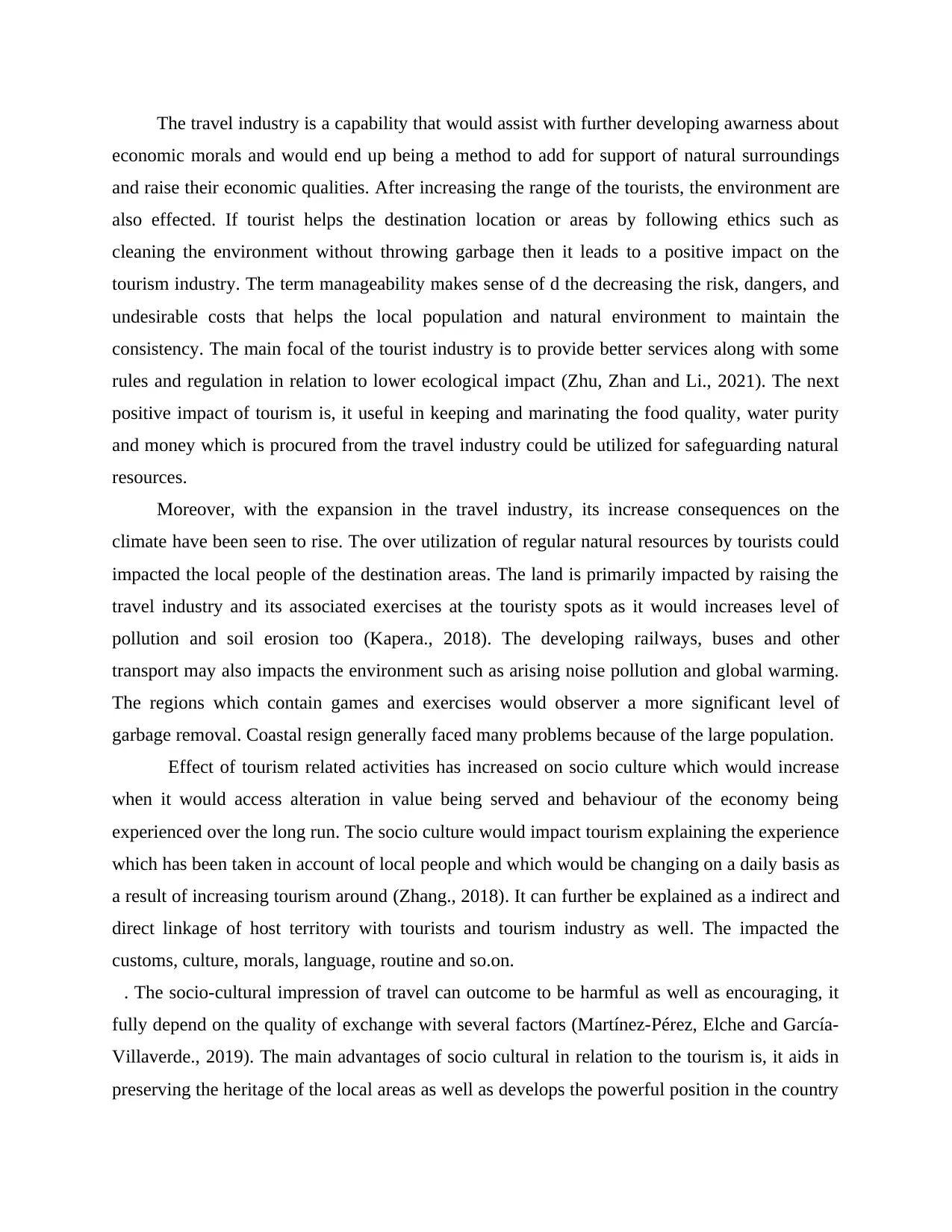
The travel industry is a capability that would assist with further developing awarness about
economic morals and would end up being a method to add for support of natural surroundings
and raise their economic qualities. After increasing the range of the tourists, the environment are
also effected. If tourist helps the destination location or areas by following ethics such as
cleaning the environment without throwing garbage then it leads to a positive impact on the
tourism industry. The term manageability makes sense of d the decreasing the risk, dangers, and
undesirable costs that helps the local population and natural environment to maintain the
consistency. The main focal of the tourist industry is to provide better services along with some
rules and regulation in relation to lower ecological impact (Zhu, Zhan and Li., 2021). The next
positive impact of tourism is, it useful in keeping and marinating the food quality, water purity
and money which is procured from the travel industry could be utilized for safeguarding natural
resources.
Moreover, with the expansion in the travel industry, its increase consequences on the
climate have been seen to rise. The over utilization of regular natural resources by tourists could
impacted the local people of the destination areas. The land is primarily impacted by raising the
travel industry and its associated exercises at the touristy spots as it would increases level of
pollution and soil erosion too (Kapera., 2018). The developing railways, buses and other
transport may also impacts the environment such as arising noise pollution and global warming.
The regions which contain games and exercises would observer a more significant level of
garbage removal. Coastal resign generally faced many problems because of the large population.
Effect of tourism related activities has increased on socio culture which would increase
when it would access alteration in value being served and behaviour of the economy being
experienced over the long run. The socio culture would impact tourism explaining the experience
which has been taken in account of local people and which would be changing on a daily basis as
a result of increasing tourism around (Zhang., 2018). It can further be explained as a indirect and
direct linkage of host territory with tourists and tourism industry as well. The impacted the
customs, culture, morals, language, routine and so.on.
. The socio-cultural impression of travel can outcome to be harmful as well as encouraging, it
fully depend on the quality of exchange with several factors (Martínez-Pérez, Elche and García-
Villaverde., 2019). The main advantages of socio cultural in relation to the tourism is, it aids in
preserving the heritage of the local areas as well as develops the powerful position in the country
economic morals and would end up being a method to add for support of natural surroundings
and raise their economic qualities. After increasing the range of the tourists, the environment are
also effected. If tourist helps the destination location or areas by following ethics such as
cleaning the environment without throwing garbage then it leads to a positive impact on the
tourism industry. The term manageability makes sense of d the decreasing the risk, dangers, and
undesirable costs that helps the local population and natural environment to maintain the
consistency. The main focal of the tourist industry is to provide better services along with some
rules and regulation in relation to lower ecological impact (Zhu, Zhan and Li., 2021). The next
positive impact of tourism is, it useful in keeping and marinating the food quality, water purity
and money which is procured from the travel industry could be utilized for safeguarding natural
resources.
Moreover, with the expansion in the travel industry, its increase consequences on the
climate have been seen to rise. The over utilization of regular natural resources by tourists could
impacted the local people of the destination areas. The land is primarily impacted by raising the
travel industry and its associated exercises at the touristy spots as it would increases level of
pollution and soil erosion too (Kapera., 2018). The developing railways, buses and other
transport may also impacts the environment such as arising noise pollution and global warming.
The regions which contain games and exercises would observer a more significant level of
garbage removal. Coastal resign generally faced many problems because of the large population.
Effect of tourism related activities has increased on socio culture which would increase
when it would access alteration in value being served and behaviour of the economy being
experienced over the long run. The socio culture would impact tourism explaining the experience
which has been taken in account of local people and which would be changing on a daily basis as
a result of increasing tourism around (Zhang., 2018). It can further be explained as a indirect and
direct linkage of host territory with tourists and tourism industry as well. The impacted the
customs, culture, morals, language, routine and so.on.
. The socio-cultural impression of travel can outcome to be harmful as well as encouraging, it
fully depend on the quality of exchange with several factors (Martínez-Pérez, Elche and García-
Villaverde., 2019). The main advantages of socio cultural in relation to the tourism is, it aids in
preserving the heritage of the local areas as well as develops the powerful position in the country
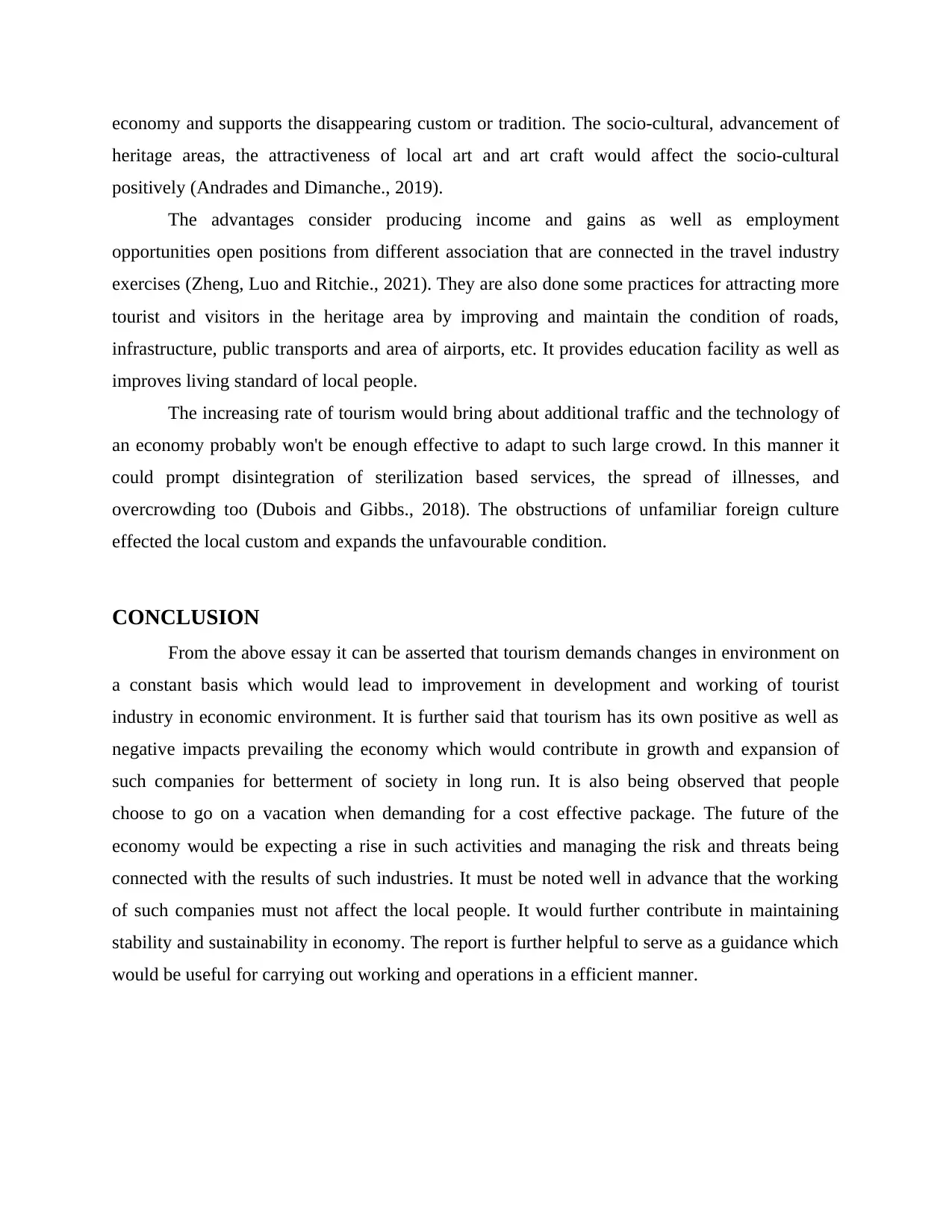
economy and supports the disappearing custom or tradition. The socio-cultural, advancement of
heritage areas, the attractiveness of local art and art craft would affect the socio-cultural
positively (Andrades and Dimanche., 2019).
The advantages consider producing income and gains as well as employment
opportunities open positions from different association that are connected in the travel industry
exercises (Zheng, Luo and Ritchie., 2021). They are also done some practices for attracting more
tourist and visitors in the heritage area by improving and maintain the condition of roads,
infrastructure, public transports and area of airports, etc. It provides education facility as well as
improves living standard of local people.
The increasing rate of tourism would bring about additional traffic and the technology of
an economy probably won't be enough effective to adapt to such large crowd. In this manner it
could prompt disintegration of sterilization based services, the spread of illnesses, and
overcrowding too (Dubois and Gibbs., 2018). The obstructions of unfamiliar foreign culture
effected the local custom and expands the unfavourable condition.
CONCLUSION
From the above essay it can be asserted that tourism demands changes in environment on
a constant basis which would lead to improvement in development and working of tourist
industry in economic environment. It is further said that tourism has its own positive as well as
negative impacts prevailing the economy which would contribute in growth and expansion of
such companies for betterment of society in long run. It is also being observed that people
choose to go on a vacation when demanding for a cost effective package. The future of the
economy would be expecting a rise in such activities and managing the risk and threats being
connected with the results of such industries. It must be noted well in advance that the working
of such companies must not affect the local people. It would further contribute in maintaining
stability and sustainability in economy. The report is further helpful to serve as a guidance which
would be useful for carrying out working and operations in a efficient manner.
heritage areas, the attractiveness of local art and art craft would affect the socio-cultural
positively (Andrades and Dimanche., 2019).
The advantages consider producing income and gains as well as employment
opportunities open positions from different association that are connected in the travel industry
exercises (Zheng, Luo and Ritchie., 2021). They are also done some practices for attracting more
tourist and visitors in the heritage area by improving and maintain the condition of roads,
infrastructure, public transports and area of airports, etc. It provides education facility as well as
improves living standard of local people.
The increasing rate of tourism would bring about additional traffic and the technology of
an economy probably won't be enough effective to adapt to such large crowd. In this manner it
could prompt disintegration of sterilization based services, the spread of illnesses, and
overcrowding too (Dubois and Gibbs., 2018). The obstructions of unfamiliar foreign culture
effected the local custom and expands the unfavourable condition.
CONCLUSION
From the above essay it can be asserted that tourism demands changes in environment on
a constant basis which would lead to improvement in development and working of tourist
industry in economic environment. It is further said that tourism has its own positive as well as
negative impacts prevailing the economy which would contribute in growth and expansion of
such companies for betterment of society in long run. It is also being observed that people
choose to go on a vacation when demanding for a cost effective package. The future of the
economy would be expecting a rise in such activities and managing the risk and threats being
connected with the results of such industries. It must be noted well in advance that the working
of such companies must not affect the local people. It would further contribute in maintaining
stability and sustainability in economy. The report is further helpful to serve as a guidance which
would be useful for carrying out working and operations in a efficient manner.
⊘ This is a preview!⊘
Do you want full access?
Subscribe today to unlock all pages.

Trusted by 1+ million students worldwide
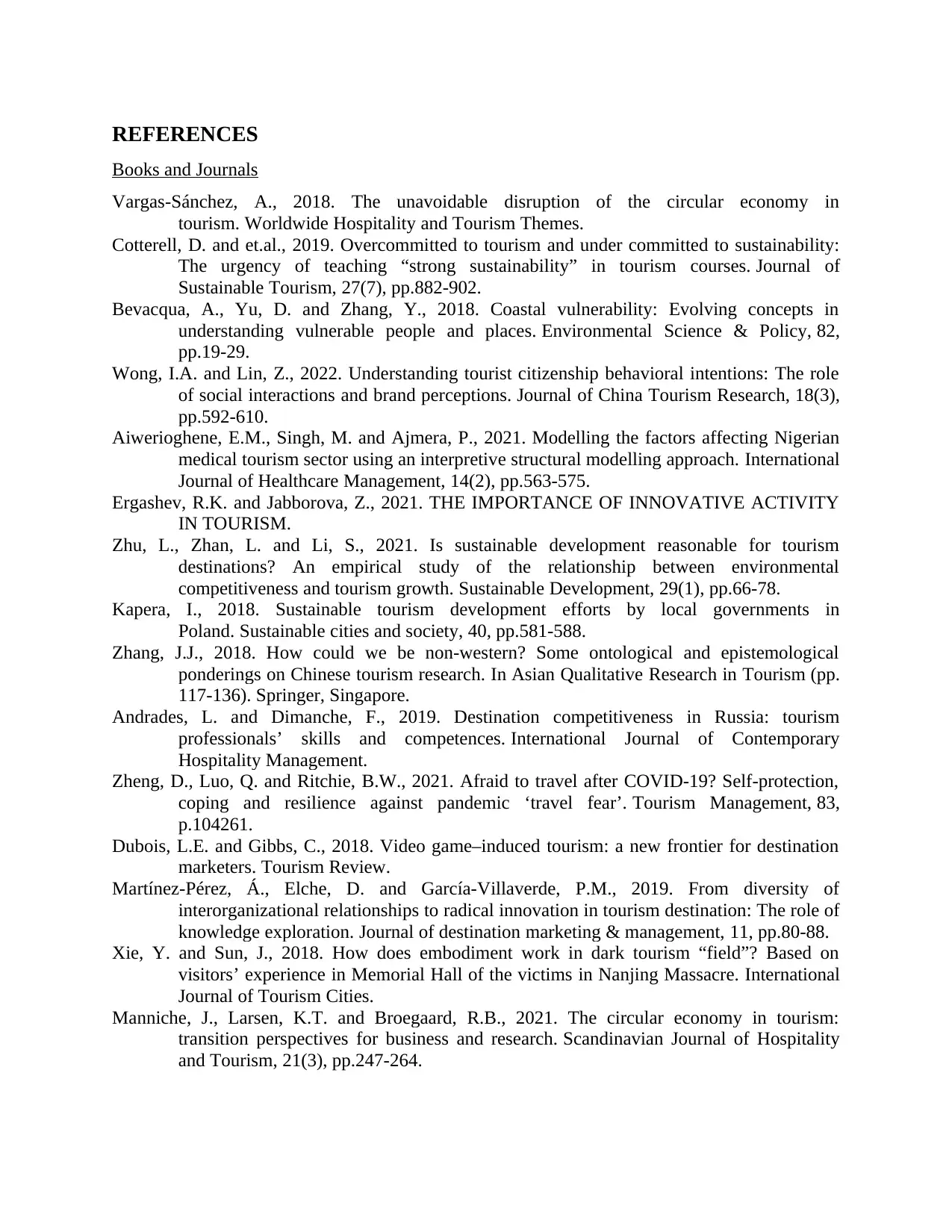
REFERENCES
Books and Journals
Vargas-Sánchez, A., 2018. The unavoidable disruption of the circular economy in
tourism. Worldwide Hospitality and Tourism Themes.
Cotterell, D. and et.al., 2019. Overcommitted to tourism and under committed to sustainability:
The urgency of teaching “strong sustainability” in tourism courses. Journal of
Sustainable Tourism, 27(7), pp.882-902.
Bevacqua, A., Yu, D. and Zhang, Y., 2018. Coastal vulnerability: Evolving concepts in
understanding vulnerable people and places. Environmental Science & Policy, 82,
pp.19-29.
Wong, I.A. and Lin, Z., 2022. Understanding tourist citizenship behavioral intentions: The role
of social interactions and brand perceptions. Journal of China Tourism Research, 18(3),
pp.592-610.
Aiwerioghene, E.M., Singh, M. and Ajmera, P., 2021. Modelling the factors affecting Nigerian
medical tourism sector using an interpretive structural modelling approach. International
Journal of Healthcare Management, 14(2), pp.563-575.
Ergashev, R.K. and Jabborova, Z., 2021. THE IMPORTANCE OF INNOVATIVE ACTIVITY
IN TOURISM.
Zhu, L., Zhan, L. and Li, S., 2021. Is sustainable development reasonable for tourism
destinations? An empirical study of the relationship between environmental
competitiveness and tourism growth. Sustainable Development, 29(1), pp.66-78.
Kapera, I., 2018. Sustainable tourism development efforts by local governments in
Poland. Sustainable cities and society, 40, pp.581-588.
Zhang, J.J., 2018. How could we be non-western? Some ontological and epistemological
ponderings on Chinese tourism research. In Asian Qualitative Research in Tourism (pp.
117-136). Springer, Singapore.
Andrades, L. and Dimanche, F., 2019. Destination competitiveness in Russia: tourism
professionals’ skills and competences. International Journal of Contemporary
Hospitality Management.
Zheng, D., Luo, Q. and Ritchie, B.W., 2021. Afraid to travel after COVID-19? Self-protection,
coping and resilience against pandemic ‘travel fear’. Tourism Management, 83,
p.104261.
Dubois, L.E. and Gibbs, C., 2018. Video game–induced tourism: a new frontier for destination
marketers. Tourism Review.
Martínez-Pérez, Á., Elche, D. and García-Villaverde, P.M., 2019. From diversity of
interorganizational relationships to radical innovation in tourism destination: The role of
knowledge exploration. Journal of destination marketing & management, 11, pp.80-88.
Xie, Y. and Sun, J., 2018. How does embodiment work in dark tourism “field”? Based on
visitors’ experience in Memorial Hall of the victims in Nanjing Massacre. International
Journal of Tourism Cities.
Manniche, J., Larsen, K.T. and Broegaard, R.B., 2021. The circular economy in tourism:
transition perspectives for business and research. Scandinavian Journal of Hospitality
and Tourism, 21(3), pp.247-264.
Books and Journals
Vargas-Sánchez, A., 2018. The unavoidable disruption of the circular economy in
tourism. Worldwide Hospitality and Tourism Themes.
Cotterell, D. and et.al., 2019. Overcommitted to tourism and under committed to sustainability:
The urgency of teaching “strong sustainability” in tourism courses. Journal of
Sustainable Tourism, 27(7), pp.882-902.
Bevacqua, A., Yu, D. and Zhang, Y., 2018. Coastal vulnerability: Evolving concepts in
understanding vulnerable people and places. Environmental Science & Policy, 82,
pp.19-29.
Wong, I.A. and Lin, Z., 2022. Understanding tourist citizenship behavioral intentions: The role
of social interactions and brand perceptions. Journal of China Tourism Research, 18(3),
pp.592-610.
Aiwerioghene, E.M., Singh, M. and Ajmera, P., 2021. Modelling the factors affecting Nigerian
medical tourism sector using an interpretive structural modelling approach. International
Journal of Healthcare Management, 14(2), pp.563-575.
Ergashev, R.K. and Jabborova, Z., 2021. THE IMPORTANCE OF INNOVATIVE ACTIVITY
IN TOURISM.
Zhu, L., Zhan, L. and Li, S., 2021. Is sustainable development reasonable for tourism
destinations? An empirical study of the relationship between environmental
competitiveness and tourism growth. Sustainable Development, 29(1), pp.66-78.
Kapera, I., 2018. Sustainable tourism development efforts by local governments in
Poland. Sustainable cities and society, 40, pp.581-588.
Zhang, J.J., 2018. How could we be non-western? Some ontological and epistemological
ponderings on Chinese tourism research. In Asian Qualitative Research in Tourism (pp.
117-136). Springer, Singapore.
Andrades, L. and Dimanche, F., 2019. Destination competitiveness in Russia: tourism
professionals’ skills and competences. International Journal of Contemporary
Hospitality Management.
Zheng, D., Luo, Q. and Ritchie, B.W., 2021. Afraid to travel after COVID-19? Self-protection,
coping and resilience against pandemic ‘travel fear’. Tourism Management, 83,
p.104261.
Dubois, L.E. and Gibbs, C., 2018. Video game–induced tourism: a new frontier for destination
marketers. Tourism Review.
Martínez-Pérez, Á., Elche, D. and García-Villaverde, P.M., 2019. From diversity of
interorganizational relationships to radical innovation in tourism destination: The role of
knowledge exploration. Journal of destination marketing & management, 11, pp.80-88.
Xie, Y. and Sun, J., 2018. How does embodiment work in dark tourism “field”? Based on
visitors’ experience in Memorial Hall of the victims in Nanjing Massacre. International
Journal of Tourism Cities.
Manniche, J., Larsen, K.T. and Broegaard, R.B., 2021. The circular economy in tourism:
transition perspectives for business and research. Scandinavian Journal of Hospitality
and Tourism, 21(3), pp.247-264.
1 out of 7
Related Documents
Your All-in-One AI-Powered Toolkit for Academic Success.
+13062052269
info@desklib.com
Available 24*7 on WhatsApp / Email
![[object Object]](/_next/static/media/star-bottom.7253800d.svg)
Unlock your academic potential
Copyright © 2020–2026 A2Z Services. All Rights Reserved. Developed and managed by ZUCOL.


